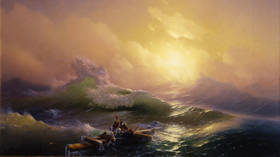Collector saves Spanish museum of Russian art from closure


A Russian art museum in the Spanish city of Malaga has been kept afloat by a British collector, after its relationship with the Russian State Museum in St. Petersburg was cut off by the conflict in Ukraine, The Guardian reported on Friday.
From now until June, the Museo Ruso will display 76 works by legendary Russian artists such as Venetsianov, Ivanov, Aivazovsky, Repin, Serov, Bakst, Benois, Kandinsky, Serebriakova, Larionov, Goncharova, Chelischev and Essaian, the newspaper reported.
The collection was gifted to the Spanish museum by Jenny Green, a Russian art aficionado and former boutique owner from London.
While the museum would normally display artworks loaned by the Russian State Museum in St. Petersburg, this relationship was “interrupted” by the conflict in Ukraine, director José María Luna said. Although Luna did not elaborate on the precise details of this interruption, he said that his museum had to return the art to Russia in May.
“Our commitment to bring Russian art to Malaga is unchanged and we now need to find another way of doing it,” Luna told the Guardian. “Russian culture isn’t responsible for what’s happening. Cancelling Russian culture doesn’t solve anything. Malevich and Tchaikovsky aren’t to blame for this situation and we will continue to work with culture as a bridge between people.”
Luna said that the museum was working with private collections throughout Europe this year and potentially next year, but that he has a contract with the St. Petersburg museum until 2025, “so we’ll have to wait and see what happens.”
While Luna is determined to keep politics and culture separate, the West has been swept by a wave of anti-Russian sentiment since Moscow launched its military operation in Ukraine nearly a year ago. Russian performers have been blacklisted and fired in Europe, Russian paintings seized and renamed as Ukrainian in the UK, and even Russian dogs and cats banned from international shows.
Kiev has demanded that Western nations boycott all aspects of Russian culture, and its calls have been taken up in Eastern Europe. Lithuanian Culture Minister Simonas Kairys declared this week that he wants to put a “mental quarantine” on all things Russian, and “abandon works [of art] that seemed acceptable to us before.”